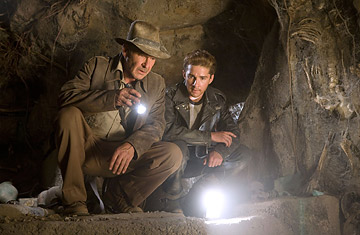
This summer's Indiana Jones and the Kingdom of the Crystal Skull. Enjoying spelunking, not concerned about the economy.
The recession — if indeed we're calling it that — should scare Indiana Jones far less than a pit of snakes this summer. That's because the durability of the movie industry during economic downturns is a Hollywood axiom, like the notion that any movie with robots will open at No. 1 and all actresses over 40 live on a farm where they are well fed and exercised. Still, the widely accepted idea that movies are recession-proof will be tested in new ways in coming months, as Indy and Batman do battle with stay-at-home entertainments people have already put on their credit cards, like iPods and plasma-screen TVs.
"When times are bad, our business seems to buck the trend," says Dan Glickman, president of the Motion Picture Association of America (MPAA). "The movies are great therapy. It's a lot cheaper than a psychiatrist."
Even during The Great Depression, Americans managed to scrape together enough nickels to take in escapist fare like Marx Brothers comedies and monster flicks. Box office grosses rose during five of the last seven economic downturns in the U.S. — including the '70s oil crisis and the burst of the dot-com bubble in the early 2000s. It's not just a ticket price bump that accounts for the extra dough, either — the total number of movies people see in a year tends to rise in recessionary periods.
At an average of less than $7 a ticket, compared to $23 for a Major League Baseball game and more than $50 for a concert, "movies are still a good value," says Glickman. "There's still this great desire to go on dates and have a social experience and a communal experience."
Money concerns typically haven't been what keeps people glued to their sofas, says Paul Dergarabedian, president of Media by Numbers, a box office analysis firm in Encino, Calif. "This business is product-driven," Dergerabedian says. "People decide whether to go to the movies based on how compelling the films are."
Films that perform well when times are bleak are pretty similar to films that perform well when weather is hot — comic book movies, animated films, sequels, "movies kids drag their parents to," says Dergarabedian. That's good news for summer movies like the Wachowskis' Speed Racer, Jack Black's Kung Fu Panda, and the latest Chronicles of Narnia installment, Prince Caspian, and less auspicious for the Dakota Fanning Southern Gothic sex-abuse movie, Hounddog.
When money is tight, it's also a good time for Hollywood's bulletproof brands, like Pixar (Wall E), Will Smith (Hancock) and Ben Stiller (Tropic Thunder). "Whether it's an analgesic or a motion picture, you're putting your money into something familiar," says former studio executive David Weitzner, who teaches at the University of Southern California School of Cinematic Arts. This summer's old-is-new fare, like Indy, Steve Carell's Get Smart and the Sex and the City movie should all benefit from the recognition factor. But films with lesser-known pedigrees, like the graphic novel revenge movie Wanted, from Russian director Timur Bekmambetov, will need smart marketing or rave reviews to break through.
OK, so Han Solo and Groucho Marx enticed audiences to the box office in bad times, but they didn't have to compete with hundreds of cable channels and home theater systems as unspeakably powerful as the Death Star, did they? "That makes it a little harder to predict," concedes Dergarabedian. "But I still think the recession will have a negligible effect. If anything, you might see people cutting back on concessions." That's what belt-tightening looks like in the America in 2008 — popcorn movies without popcorn.
